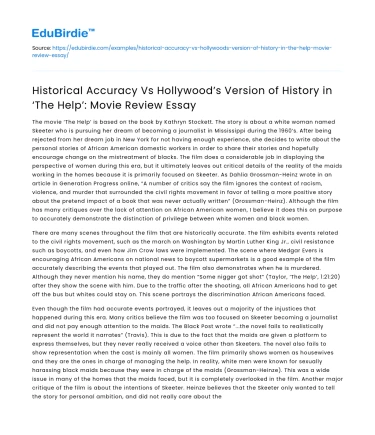The movie ‘The Help’ is based on the book by Kathryn Stockett. The story is about a white woman named Skeeter who is pursuing her dream of becoming a journalist in Mississippi during the 1960’s. After being rejected from her dream job in New York for not having enough experience, she decides to write about the personal stories of African American domestic workers in order to share their stories and hopefully encourage change on the mistreatment of blacks. The film does a considerable job in displaying the perspective of women during this era, but it ultimately leaves out critical details of the reality of the maids working in the homes because it is primarily focused on Skeeter. As Dahlia Grossman-Heinz wrote in an article in Generation Progress online, “A number of critics say the film ignores the context of racism, violence, and murder that surrounded the civil rights movement in favor of telling a more positive story about the pretend impact of a book that was never actually written” (Grossman-Heinz). Although the film has many critiques over the lack of attention on African American women, I believe it does this on purpose to accurately demonstrate the distinction of privilege between white women and black women.
There are many scenes throughout the film that are historically accurate. The film exhibits events related to the civil rights movement, such as the march on Washington by Martin Luther King Jr., civil resistance such as boycotts, and even how Jim Crow laws were implemented. The scene where Medgar Evers is encouraging African Americans on national news to boycott supermarkets is a good example of the film accurately describing the events that played out. The film also demonstrates when he is murdered. Although they never mention his name, they do mention “Some nigger got shot” (Taylor, ‘The Help’, 1:21:20) after they show the scene with him. Due to the traffic after the shooting, all African Americans had to get off the bus but whites could stay on. This scene portrays the discrimination African Americans faced.
Save your time!
We can take care of your essay
- Proper editing and formatting
- Free revision, title page, and bibliography
- Flexible prices and money-back guarantee
Even though the film had accurate events portrayed, it leaves out a majority of the injustices that happened during this era. Many critics believe the film was too focused on Skeeter becoming a journalist and did not pay enough attention to the maids. The Black Post wrote “...the novel fails to realistically represent the world it narrates” (Travis). This is due to the fact that the maids are given a platform to express themselves, but they never really received a voice other than Skeeters. The novel also fails to show representation when the cast is mainly all women. The film primarily shows women as housewives and they are the ones in charge of managing the help. In reality, white men were known for sexually harassing black maids because they were in charge of the maids (Grossman-Heinze). This was a wide issue in many of the homes that the maids faced, but it is completely overlooked in the film. Another major critique of the film is about the intentions of Skeeter. Heinze believes that the Skeeter only wanted to tell the story for personal ambition, and did not really care about the civil rights movement (Grossman-Heinze). This is demonstrated in the entire film when Skeeter is busy writing the journals for her own gain, while the black women were doing this for radical change in their lives. The film romanticized their relationship, but it is evident that Skeeter was focused on her job more than the civil rights movement because she does the stories in a rush to have them in “...while the civil rights movement is still hot” (Grossman-Heinze).
Although the film may not be a historic film, it still has valuable information that helps understand the 1960’s in the lives of whites and blacks in Mississippi. If I got anything from this movie it is that women were much more important in the civil rights movement than often taught in schools because they usually focus on the men. A question that stuck with me is if there was any way a story like this could actually happen. It seems impossible to keep something major like this anonymous from such a conservative community. A viewpoint that was distorted was the relationship between Mrs. Cecilia and Missy. Mrs. Cecilia came from the lower class and therefore was rejected by the elite community. In the film Mrs. Cecilia and Missy form a great bond, but in reality, most lower-class whites discriminated against blacks as well even though they were both frowned upon by the higher white classes.
Although this movie may not be the best for educational purposes, it still has worthwhile information. I do not blame the directors as this is a Hollywood film and not a documentary. I would recommend this movie to a friend, because I believe it is important to show all aspects of the civil rights movement. This film does a great job at showing the perspective from a woman's point of view, black and white.
Works Cited
- YouTube, YouTube, http://www.youtube.com/watch?v=CYx1LBFsvEk&t=5098s
- “Review: The Help Trades Historical Accuracy for a Cheery Story”. Generation Progress, 16 Aug. 2011, http://genprogress.org/review-the-help-trades-historical-accuracy-for-a-cheery-story/
- Travis, Trysh. “Is The Help Realistic? It Depends. • BlackPast.” BlackPast, 12 Sept. 2019, http://www.blackpast.org/african-american-history/help-realistic-it-depends/






 Stuck on your essay?
Stuck on your essay?

